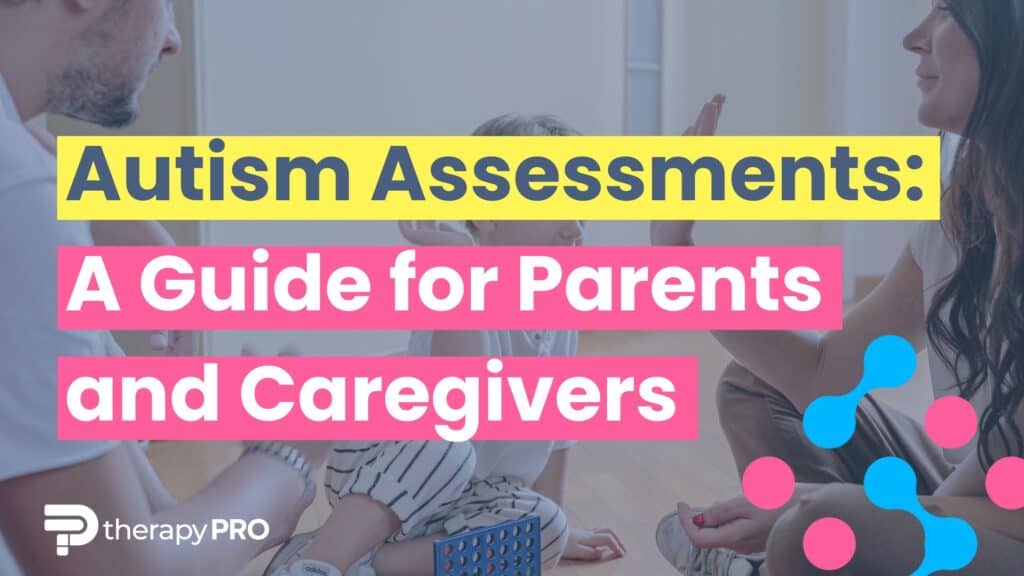Autism Assessments: A Guide for Parents and Caregivers
This detailed guideline is designed to help parents and caregivers learn more about autism assessments.
We cover a range of information, from the different types of assessments, how to book in assessments, and we also share resources and tips to make your journey as smooth as possible.
We’re going to explore how parents can navigate the NDIS space to ensure their autistic child receives the best possible supports to help them reach their goals.
We understand that as a parent, you want only the best for your child, and it’s natural to feel uncertain about a new topic you’re unfamiliar with.
Remember this though: an autistic child is as unique as the next person; they interact with the world around them as individually as any of us do. However, their experiences can sometimes present challenges.
So, what is autism?
Autism is a neurodiverse condition that affects many children and adults. While it can present challenges, it’s helpful to remember that it’s only one aspect of your child’s unique identity.
Our language will be neuro-affirming throughout this article, meaning we will use language that acknowledges and respects the diverse ways people experience autism.
Inclusion of diversity is important to us here at Therapy Pro. Our therapists work with autistic children, adolescents, and adults every day to ensure their needs are met and that they feel supported to undertake daily tasks. Part of this work involves educating the neuro-typical on the wonderful ways autism can enrich lives.
However, early diagnosis and intervention are crucial in supporting autistic children to reach their full potential. This is where the National Disability Insurance Scheme (NDIS)
comes in.
The NDIS provides funding for people with disabilities to access the support they need to thrive. We want to help you understand the NDIS and how you can access support services for your autistic child.
Let’s take a closer look.
Understanding autism assessments
If you suspect your child may be autistic, it’s important to seek an assessment. This is the first step in your journey towards a formal diagnosis.
Autism assessments help to identify your child’s strengths and challenges. There are two main types of assessments available: diagnostic and developmental.
Diagnostic assessments for autism
Diagnostic assessments are typically conducted by a medical professional, such as a paediatrician, a psychiatrist, or clinical psychologist.
The aim of the diagnostic assessment is to determine whether your child meets the criteria for an autism diagnosis. This type of assessment may involve a series of interviews with you and your child, as well as observations of your child’s behaviour.
Developmental assessments for autism
On the other hand, developmental assessments focus on your child’s overall development and can be conducted by a range of professionals, including speech and language pathologists, occupational therapists, and psychologists.
A registered NDIS psychologist can also support.
This type of assessment can identify any developmental areas that may be impacting your child’s daily activities, such as language or social skills.
How autism assessments are conducted
Assessments can be conducted by a range of professionals, depending on your child’s needs and the services available in your area. It’s important to find a therapist who has experience and training in assessing autistic children, and confirm this with your therapist, as not every professional can or should undertake autism assessments.
During an assessment your child may be asked to complete tasks or answer questions, and the assessor will observe their behaviour. You may also be asked to provide information about your child’s development and behaviour.
It’s natural to feel anxious or uncertain about the assessment process but remember that it’s an important step towards understanding your child’s needs and providing them with the best possible support. Be sure to ask questions and raise any concerns you have with the therapists involved.
Navigating the NDIS space
Once your child has been assessed and has received a diagnosis of autism, you may wish to apply for funding via the NDIS.
The NDIS is a government-funded scheme that provides support for people with disabilities, including those with autism. The NDIS can provide funding for a range of supports and services that can help your child reach their full potential.
The NDIS provides support for individuals who have difficulties participating in their daily activities. Eligibility criteria is available. The NDIS also has age and residency requirements.
Steps for applying for the NDIS
To apply for the NDIS, you will need to complete an Access Request Form and provide evidence of your child’s disability.
This can include reports from medical professionals, and for an autistic child, this would include a diagnosis of autism, as well as the evidence of how your child’s autism affects their daily life.
Once your child is approved for the NDIS, you can work with a Local Area Coordinator or Early Childhood Intervention Coordinator to develop a plan that outlines your child’s goals and the support they require. They can also connect you with services and supports in your area.
This plan is called an NDIS plan and is reviewed regularly to ensure it continues to meet your child’s needs each year.
The NDIS plan includes funding for a range of supports and services for your child, such as therapy, equipment, programs, and activities. Therapy Pro is a NDIS registered provider.
Understanding how the NDIS funds autism supports is very useful.
Three good resources for parents and caregivers
While their website will help you to understand autism and the NDIS system and how to apply for and use supports and services, there are many other useful resources available.
You will find helpful information to understand your child’s needs, learn about the various services and supports available, and connect with other families who have been through similar situations.
You don’t need to understand everything about autism immediately, and you certainly don’t need to walk the journey alone. Bookmark these resources and keep them on hand.
- Autism Awareness Australia is a not-for-profit organisation that provides information, support, and advocacy for people on the autistic spectrum, and their families.
- Autism Spectrum Australia (Aspect) is a national provider of services for people on the autism spectrum and their families.
- The Raising Children Network is a well-regarded and respected website that provides information and resources for parents of children from birth to 18 years old.
Tips to avoid feeling too overwhelmed
As a parent or caregiver, it is natural to feel overwhelmed at times, regardless of whether your child is autistic or not.
Children on the autistic spectrum have a different way of viewing and interacting with the world around them. And as a supportive adult, it can be a little difficult to understand this, or know the best way to respond to your child to ensure their needs are being met.
Here are some tips to help you avoid feeling too overwhelmed:
- Educate yourself – learn as much as you can about autism, the assessment process, and the NDIS. This will help you better understand your child’s needs and the support available to you.
- Advocate for your child – You are your child’s biggest advocate. Don’t be afraid to speak up and ask for what your child needs. Remember, you know your child best.
- Connect with other parents – Connecting with other parents with autistic children can be a valuable source of support and information. Consider joining a support group or online forums.
- Take care of yourself – Caring for a child, autistic or otherwise, can be emotionally and physically draining! Remember to take care of yourself by practicing self-care and seeking support when you need it.
- Celebrate your unique child’s strengths – While autism can present challenges, it’s important to celebrate your child’s strengths and accomplishments! They are also navigating a challenging and sometimes confusing world. Focus on what your beautiful child can do, rather than what they cannot.
Wrapping up our guide on autism assessments
In this article, we’ve covered the basics of autism assessments, the NDIS, and tips for parents and caregivers.
Here are the key points to remember:
- Autism assessments are an important tool for identifying and understanding a child’s needs.
- The NDIS is a government-funded program that provides support and funding for people with disabilities, including those on the autism spectrum.
- Resources are available to help parents access services and supports for their child.
- Educating yourself, connecting with others, and celebrating your child’s uniqueness will help reduce any overwhelm.
Early diagnosis and intervention are critical for children on the autism spectrum. Research has shown that early intervention can improve outcomes such as helping autistic children develop social and communication skills and reducing the impact of challenging behaviours.
The earlier a child receives support, the better their long-term outcomes are likely to be in these areas.
If you are a parent or a caregiver of a child who may be displaying signs of autism, remember you don’t have to navigate this journey alone.
There are many resources and supports available to help you and your child. Seeking help and support early can make a big difference in your child’s development and quality of life.
Every child is unique. There is no one-size-fits-all approach to raising and caring for children, and your autistic child is no different in this regard. Take the time to understand your child’s individual needs and work with healthcare professionals and support services to provide the best possible support.
Our assessment clinic
Our Melbourne-based assessment clinic supports parents and caregivers looking to have their child assessed for possible autism.
There are a number of assessments available, and our team would be more than happy to assist.
Your first step is to fill out the form below and our team will be in touch.




